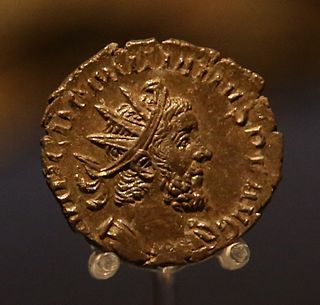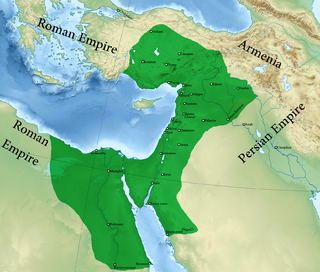This page is based on this
Wikipedia article Text is available under the
CC BY-SA 4.0 license; additional terms may apply.
Images, videos and audio are available under their respective licenses.
The 260s decade ran from January 1, 260, to December 31, 269.

Year 261 (CCLXI) was a common year starting on Tuesday of the Julian calendar. At the time, it was known as the Year of the Consulship of Gallienus and Taurus. The denomination 261 for this year has been used since the early medieval period, when the Anno Domini calendar era became the prevalent method in Europe for naming years.

Commodus, born Lucius Aurelius Commodus and died Lucius Aelius Aurelius Commodus, was Roman emperor with his father Marcus Aurelius from 177 to his father's death in 180, and solely until 192.

Ptolemy XV Philopator Philometor Caesar, better known by the nicknames Caesarion and Ptolemy Caesar, was the last Pharaoh of Egypt, reigning with his mother Cleopatra VII from 2 September 44 BC until her death by 12 August 30 BC and as sole ruler until his death was ordered by Octavian, the later Roman emperor Augustus. Caesarion was the eldest son of Cleopatra and possibly the only biological son of Julius Caesar, after whom he was named. He was the last sovereign member of the Ptolemaic dynasty of Egypt. In addition to being co-ruler of Egypt as Pharaoh with his mother, he was expected to be his father's successor as the Roman emperor.

The Carolingian dynasty was a Frankish noble family founded by Charles Martel with origins in the Arnulfing and Pippinid clans of the 7th century AD. The dynasty consolidated its power in the 8th century, eventually making the offices of mayor of the palace and dux et princeps Francorum hereditary, and becoming the de facto rulers of the Franks as the real powers behind the Merovingian throne. In 751 the Merovingian dynasty which had ruled the Germanic Franks was overthrown with the consent of the Papacy and the aristocracy, and a Carolingian Pepin the Short was crowned King of the Franks. The Carolingian dynasty reached its peak in 800 with the crowning of Charlemagne as the first Emperor of Romans in the West in over three centuries. His death in 814 began an extended period of fragmentation of the Carolingian empire and decline that would eventually lead to the evolution of the Kingdom of France and the Holy Roman Empire.

Domitianus was probably a Roman soldier of the mid 3rd century who was acclaimed emperor, probably in northern Gaul in late 270 or early 271, and struck coins to advertise his elevation. It is now generally assumed that this man is to be equated with the Domitianus who is twice mentioned in the literary sources as a significant figure in the politics of the age, but on neither occasion as an outright contender for the Imperial throne.

Septimius Udhayna, Latinized as Odaenathus, was the founder king (Mlk) of the Palmyrene Kingdom centered at Palmyra, Syria. He lifted his city from the position of a regional center subordinate to Rome into the supreme power in the East. Odaenathus was born into an aristocratic Palmyrene family that received Roman citizenship in the 190s under the Severan dynasty. He was the son of Hairan the descendant of Nasor. The circumstances surrounding his rise are ambiguous; he became the lord (Ras) of the city, a position created for him, as early as the 240s and by 258, he was styled a consularis, indicating a high status in the Roman Empire.
Balista or Ballista, also known in the sources with the name of "Callistus", was one of the Thirty Tyrants of the controversial Historia Augusta, and supported the rebellion of the Macriani against Emperor Gallienus.

Valens Thessalonicus was a Roman usurper against Roman Emperor Gallienus.
The Gallienus usurpers were the usurpers who claimed imperial power during the reign of Gallienus. The existence of usurpers during the Crisis of the Third Century was very common, and the high number of usurpers fought by Gallienus is due to his long rule; 15 years was a long reign by the standards of the 3rd century Roman Empire.

Lucius Calpurnius Piso Frugi was a Roman usurper, whose existence is questionable, being based only on the unreliable Historia Augusta.

The Battle of Edessa took place between the armies of the Roman Empire under the command of Emperor Valerian and Sassanid forces under Shahanshah Shapur I in 260. The Roman army was defeated and captured in its entirety by the Persian forces; for the first time in Rome's military history their emperor was taken prisoner. As such, the battle is generally viewed as one of the worst disasters in Roman military history.

The Palmyrene Empire was a splinter state centered at Palmyra which broke away from the Roman Empire during the Crisis of the Third Century. It encompassed the Roman provinces of Syria Palaestina, Arabia Petraea, Egypt and large parts of Asia Minor.












